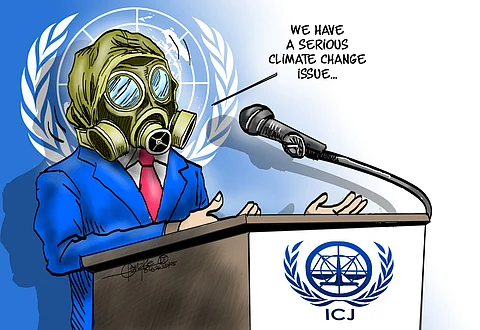
- NEWS
- the EDIT
- COMMENTARY
- BUSINESS
- LIFE
- SHOW
- ACTION
- GLOBAL GOALS
- SNAPS
- DYARYO TIRADA
- MORE

Earlier this week, the United Nations’ highest court, the International Court of Justice (ICJ), handed down its first ever opinion on climate change, saying clearly that the climate must be protected for present and future generations, and that failing to protect the planet from the impacts of climate change may be a violation of international law.
ICJ President Yuji Iwasawa, who delivered the groundbreaking advisory opinion at the Peace Palace in The Hague on Wednesday, stated, “The failure of a state to take appropriate measures to protect the climate system may constitute an internationally wrongful act.”
And the consequences of a country failing to fulfil its duty would be “full reparations to injured states in the form of restitution, compensation, and satisfaction.”
Iwasawa described the climate crisis as “an existential problem of planetary proportions that imperils all forms of life and the very health of our planet.”
He went on to say, in no uncertain terms, that greenhouse gas emissions are “unequivocally caused by human activities,” with cross-border effects.
The historic ICJ opinion may be non-binding but experts say it will have far-reaching consequences, with significant legal and moral authority in shaping international law and jurisprudence.
As expected, it was immediately and heartily welcomed by climate advocates and environmental groups around the world. In Asia, where millions face rising seas, stronger storms, and climate-induced displacement, the ruling was hailed as a critical turning point.
Said ASEAN Parliamentarians for Human Rights Co-Chair Charles Santiago, “Across Southeast Asia, from the flooded rice paddies in Vietnam to the storm-battered coasts in the Philippines, the ICJ advisory opinion lays down a firm legal marker.”
Environmental lawyer Gerthie Mayo-Anda said the opinion adds weight to existing climate legislation in the Philippines. The ICJ’s opinion, she said, helps “strengthen advocacy efforts and accountability actions of vulnerable communities in the Global South.”
The landmark opinion’s roots stemmed from a group of students from Pacific Island countries who, in 2020, lobbied governments to call for the legal clarification of nations’ obligations in tackling climate change.
Specifically, Vanuatu, a South Pacific island nation in Melanesia known for its volcanic origin and vibrant coral reefs, asked the ICJ to rule on the obligations of states under international law to protect the climate and environment, and by extension, future generations from greenhouse gas emissions.
In the case it brought before the ICJ, Vanuatu also asked for clarification on the legal consequences on countries that fail to meet their obligation to slow their emissions.
Experts say countries and regions emitting the most CO2 cumulatively — including the US, China, Russia, and the European Union — carry the most responsibility for global warming.
Last Wednesday, 23 July, the world’s highest court spoke — and its verdict? Polluters must pay.
So far, some 3,000 climate-related cases have been filed in almost 60 countries. With its ruling last Wednesday in the landmark case brought by Vanuatu, the ICJ, in effect, has decided the future course of climate accountability.
“The advisory opinion marks a turning point for legislation,” said Joana Setzer, an associate professorial research fellow at the London School of Economics’ Grantham Research Institute.
“Its authoritative interpretation of countries’ legal obligations will serve as a crucial tool for domestic courts, litigants, and advocates striving to hold governments accountable,” she stressed.
The ICJ’s advisory opinion may not be binding, but it paves the way for countries, groups and individuals hit by climate change to pursue legal action against high-emitting nations, including for past emissions.
It holds particular significance for Asia, where many countries are vulnerable to rising sea levels, extreme weather, and climate-driven migration, with people forced to leave their homes due to climate change impacts, whether these are sudden-onset events like floods and hurricanes or slow-onset changes like desertification and sea level rise.
And it serves as a call to action by the world’s highest court — for climate advocates and vulnerable nations in Asia and elsewhere to use the ICJ’s ruling to push for stronger climate action, including increased financial support and a faster transition away from fossil fuels.
